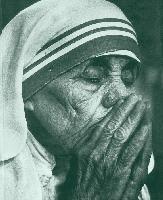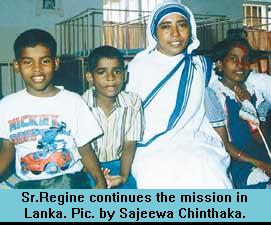


![]()

Mother ives on.....: |
Contents
|
"Be the living expression of God ‘s kindness; kindness in your face, kindness in your eyes, kindness in your smile, kindness in your warm greeting . To children, to the poor, to all who suffer and are lonely, give always a happy smile. Give them not only your care, but also your heart"- Mother Teresa.
Mother Teresa, the tiny simple Roman Catholic nun who strode the slums of Calcutta like a ‘Living Saint’ for over five decades and earned the touching appellations "Mother of Mercy", and "India’s Angel of the slums" died of a heart attack on 5th September 1997 at the ripe age of 87 years. More than almost anyone else, Mother Teresa has helped to alleviate the suffering of the sick and the poor in this century. In 1989 she was fitted with a pacemaker after treatment for a Cardiac ailment at a Calcutta hospital and since then her health condition started to deteriorate. Her doctors say her illness was compounded by the nun’s hectic schedule of work and travel to over 500 homes around the world.
Mother Teresa was born Agnes Gonxha Bojaxhiu to Albanian parents at Skopje in Yugoslavia on 26th August 1910. From her early days of childhood Mother Teresa seemed determined to utilize her God given talents for His greater glory. By the age of 12 she wanted to be a nun and became increasingly interested in the East. When she was 18,she joined the Irish order of the Sisters of Loretto because she knew they worked widely in India and after doing a brief training in Dublin (where she learnt English) she proceeded to India in 1928 to begin her novitiate. After taking her vows in 1931, she served as a geography teacher at St. Mary’s School and St. Teresa’s School in Calcutta. Sister Teresa came to be called Mother Teresa after she took her final vows in 1937 in the Loretto Convent located in the hill station of Darjeeling.
She assumed her new habit (the distinctive white sari with a blue border) and settled in the Calcutta slums, working with a small team of supporters. At the threshold of her mission with the words "the poor must know that we love them", she commenced her work for sick and dying.
And without much delay she received her mandate to be a free nun outside the cloister and founded her new Order "Missionaries of Charity" on October 7, 1950. The routine of these sisters is relentlessly arduous, with every waking moment given either to the people they care for, or God. Indeed it is hard to understand how anyone could actually choose to dedicate their entire life to such a cause. But despite the harsh regime, this is a happy place, and a great success story and the Order has spread its wings to 537 homes throughout the world in over 130 countries.
She also earned a reputation as a media personality for unhesitantly upholding Catholic Doctrine. At the National Prayer Breakfast held in Washington DC on February 4th, 1994 she spoke to the elite audience including President Bill Clinton. She said, "the poor are very great people.
I had the honour of meeting Mother Teresa briefly during one of her visits to Sri Lanka and the few words exchanged with her inspired me tremendously. A friend of mine who visited one of her homes ‘Shishu Bhavan’ in Calcutta recalled reading a quotation. "Of all the nice things in the world the nicest must be Mother",which was hung in a dormitory painted in bright colours with images mixing Christian, Hindu and Muslim traditions where dozens of abandoned and orphaned babies crawled on the floor.
Mother Teresa the frail, aged, wrinkled but radiant Nun who cared and nursed millions of unwanted and forgotten people will be missed by the poor of poor but her band of energetic nuns whom she nourished and strengthened for her mission will continue to fulfill the aspirations of its founder for the greater glory of God.
She lived according to her own words "Keep the joy of loving God in your heart and share this joy with all you meet".
 The
death of Mother Theresa left the world empty of one of its most revered
missionaries, charity workers and arguably the most well-known Catholic nun in
history. But the work she began in the slums of Calcutta is not, by any means
threatened by the passing of the 87 year-old Mother.
The
death of Mother Theresa left the world empty of one of its most revered
missionaries, charity workers and arguably the most well-known Catholic nun in
history. But the work she began in the slums of Calcutta is not, by any means
threatened by the passing of the 87 year-old Mother.
The order she founded as the Missionaries of Charity carry on the work of providing shelter and care for the abandoned and homeless throughout India and in many other countries. In Sri Lanka too, these sisters run six homes. In Modera, Moratuwa, Galle, Kandy, Trincomalee and Vavuniya, Missionaries of Charity spread the good work initiated by Mother Theresa. Each home is run by a mixed community of sisters from India, Sri Lanka, Bangladesh and even Yugoslavia, Albania and New Zealand.
A few dilapidated buildings behind the St. John’s Church in Mattakkuliya shelters the six sisters working in the name of Mother Theresa and their wards. Some 140 aged, sick and abandoned people and 45 children of ages ranging from 4 to 18 are looked after by these sisters. In their blue trimmed white cotton saris the bare footed sisters walked around the home attending to the needy. There were no signs of comfort. The elderly were housed in several dormitories, each with a large number of beds arranged in rows. The very sick were simply separated from the others with a flimsy curtain. Despite such bare facilities the sisters yet do not refuse any person who seeks shelter at the ‘Shanthi Niwasa’ as the home is known. Nor does the home discriminate against those coming in with disabilities, physical or mental.
 "If
a person is dying on the streets we definitely take him in and give him shelter
during his last hours," Sr. Regine the Superior said. Having arrived here
from India three years ago Sr. Regine became Superior of Shanthi Niwasa last
year.
"If
a person is dying on the streets we definitely take him in and give him shelter
during his last hours," Sr. Regine the Superior said. Having arrived here
from India three years ago Sr. Regine became Superior of Shanthi Niwasa last
year.
Although dedicated to taking old and sickly people out of the streets and caring for them during the last years of their lives, the sisters also have in their care a number of children. These are either total orphans or with one parent who cannot afford to take care of them for some reason. The sisters also attempt to take street children into their care. "Sometimes it’s not easy to convince mothers who keep children on the street to leave them here, under our care," Sr. Regine said. "We have to go out to them talk and persuade them to give their children a better chance."
While sweepers swept Tuesday and dignitaries inspected the broad avenues where no less than the Indian Army would escort Mother Teresa to her grave on Saturday, Dr. Sushinet Raichou-dhury, poised on a rough stool in a makeshift clinic miles away, focused on the rasping chest and bloated stomach of 3- year-old Salim Pyada.
‘’It’s another upper respiratory tract infection,’’ Dr.Raichoudhury said, as Salim’s anxious mother, Soburjan Bibi, crouched on the muddy floor - in her worn sari, reaching up now and then to wipe the nose of her wailing son.
Next to him on the examination bench, a listless, bone-thin boy and his frightened mother watched another doctor try to read an X-ray in a shed with no lights.
All over the poorest neighborhoods of Calcutta every day, countless medical professionals and volunteers whose names will never be famous defy dispiriting odds to care for those in this city of 14 million people with no recourse but to beg for help.
In shopfront herbal dispensaries, under tarpaulins whipped by rain and wind, in cramped, stifling rooms off narrow alleys where orphans are clothed and fed, Calcutta looks like a town where a lot of people with very little money try to relieve the sufferings of others and give them some kind of future.
"Like Hollywood makes the star, Calcutta makes the social worker," said a man with a minuscule unnamed charity foundation that dispenses small mercies like free eyeglasses and notebooks for school children.
The efforts grow from individual instincts and private initiative, and they are not always welcomed by ward politicians who drive small charities out of neighborhoods to prevent them from becoming centers of self-help and self-awareness .
Neighbourhood philanthropists, many of whom do not want to be quoted or named, say that better health and a little knowledge threaten entrenched politicians whose corruption has helped create the squalor and deprivation.
Mother Teresa has been an inspiration to many in the city, and her 1979 Nobel Prize apparently drew more middle-class Calcuttans into volunteer work in the slums and among the homeless.
But under the surface there is often a hint of resentment that her international fame has given her order, the Missionaries of Charity, political immunity-not to mention enough money to run an empire of good works in scores of countries.
There are also gentle disagreements about the avowedly Christian aims that the name Missionaries of Charity imply in a majority Hindu country, and about the European-born founder’s proclivity for accepting social conditions and alleviating them rather than trying to change the social environment in which most Calcuttans live.
Many small-scale foundations in Calcutta are committed to family planning for example, which Mother Teresa largely opposed because they see at gutter level every day the tragedy of malnourished, unwanted children.
- New York Times Service
![]()
| HOME PAGE | FRONT PAGE | EDITORIAL/OPINION | NEWS / COMMENT | BUSINESS
Please send your comments and suggestions on this web site to
info@suntimes.is.lk or to
webmaster@infolabs.is.lk